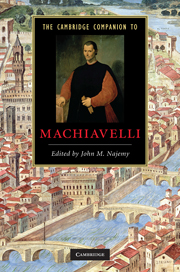Book contents
- Frontmatter
- Introduction
- 1 Niccolò Machiavelli: a portrait
- 2 Machiavelli in the chancery
- 3 Machiavelli, Piero Soderini, and the republic of 1494-1512
- 4 Machiavelli and the Medici
- 5 Machiavelli’s Prince in the epic tradition
- 6 Society, class, and state in Machiavelli’s Discourses on Livy
- 7 Machiavelli’s military project and the Art of War
- 8 Machiavelli’s Florentine Histories
- 9 Machiavelli and Rome: the republic as ideal and as history
- 10 Philosophy and religion in Machiavelli
- 11 Rhetoric and ethics in Machiavelli
- 12 Machiavelli and poetry
- 13 Comedian, tragedian: Machiavelli and traditions of Renaissance theater
- 14 Machiavelli and gender
- 15 Machiavelli’s afterlife and reputation to the eighteenth century
- 16 Machiavelli in political thought from the age of revolutions to the present
- Index
9 - Machiavelli and Rome: the republic as ideal and as history
Published online by Cambridge University Press: 28 September 2010
- Frontmatter
- Introduction
- 1 Niccolò Machiavelli: a portrait
- 2 Machiavelli in the chancery
- 3 Machiavelli, Piero Soderini, and the republic of 1494-1512
- 4 Machiavelli and the Medici
- 5 Machiavelli’s Prince in the epic tradition
- 6 Society, class, and state in Machiavelli’s Discourses on Livy
- 7 Machiavelli’s military project and the Art of War
- 8 Machiavelli’s Florentine Histories
- 9 Machiavelli and Rome: the republic as ideal and as history
- 10 Philosophy and religion in Machiavelli
- 11 Rhetoric and ethics in Machiavelli
- 12 Machiavelli and poetry
- 13 Comedian, tragedian: Machiavelli and traditions of Renaissance theater
- 14 Machiavelli and gender
- 15 Machiavelli’s afterlife and reputation to the eighteenth century
- 16 Machiavelli in political thought from the age of revolutions to the present
- Index
Summary
To write about Machiavelli and republicanism is to expose both writer and reader to a series of temptations and misunderstandings. There was an ideal of government to which we are used to applying the terms “republic” and “republicanism,” and Machiavelli addressed himself to it; but how far he or his contemporaries employed a vocabulary readily translated by these terms is another question, since res publica, or its English translation “commonwealth,” could be used to mean any political body, irrespective of whether it was ruled by a monarch or not. There is a historical process by which “republic” and “commonwealth” came to be used in English as denoting kingless government, and “republicanism” came to be opposed to “monarchism”; and as this happened, the two terms came to denote opposed political norms, each supported by a theory of government and even a philosophy of political life. For these reasons it is possible to use “republicanism” as denoting an intellectually complex and historically continuous ideology, and to assign Machiavelli his place in its history. A history of “Machiavelli and republicanism” can in principle be written as a history of how it became possible to see him and his role in this way. The history may well prove to have been going on for a long time, and even to have begun taking place in his lifetime and affecting his thoughts and intentions.
- Type
- Chapter
- Information
- The Cambridge Companion to Machiavelli , pp. 144 - 156Publisher: Cambridge University PressPrint publication year: 2010
- 7
- Cited by

